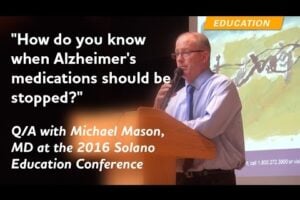An important study showed a significantly lower mortality rate in patients who were treated with galantamine, a prescription medicine for mild to moderately severe Alzheimer’s disease, versus those who received placebo. Patients treated with galantamine also had significantly lesser decline in cognitive impairment after two years, compared to patients in the placebo group, according to investigators presenting the data at the American College of Neuropsychopharmacology 51st Annual Meeting in Hollywood, Fla. Janssen Research & Development, LLC, sponsored the study.
Galantamine is the generic name for the brand-name drugs Reminyl (UK) and Razadyne (USA). It is also spelled, “Galanthamine.” In treating Alzheimer’s, it competes with two similar drugs used to control levels of brain acetylcholinesterase in dementia patients.
These drugs are:
| Brand Name | Generic Name |
| Aricept® | donepezil |
| Exelon® or Ebixa® | rivastigmine |
| Reminyl® or Razadyne® | galantamine or galanthamine |
Statistics Overview
At the study’s final interim mortality analysis, an independent Data Safety Monitoring Board recommended early termination of the study due to an imbalance of deaths between the treatment group and the placebo group. Subsequent unblinding of the data indicated that mortality was statistically significantly lower in patients treated with galantamine, compared to patients who received placebo [3.1 percent versus 4.9 percent respectively; (P=0.021)]. In the final analysis, there was a total of 89 deaths; 33 (3.2 percent) in the galantamine group and 56 (5.5 percent) in the placebo group (P=0.011).
The treatment group also had significantly lesser cognitive decline measured by the change from baseline in the Mini Mental Status Evaluation (MMSE) at month 24 of the study, compared to the group treated with placebo. The mean MMSE scores deteriorated from a baseline of 19 to 16.9 and 17.5 for the placebo and galantamine groups, respectively (P<0.001). The MMSE is a validated measure of cognition.
Additionally, there was a significantly greater decline from baseline in MMSE at month 6 in the placebo group compared with the galantamine group (P<0.001). The change in activities of daily living, as measured by the Disability Assessment in Dementia (DAD) scores from baseline to month 24, was significantly worse in the placebo group than in the galantamine group (P=0.002). The DAD is a validated measure of activities of daily living.
About the Study
The randomized, double-blind, placebo-controlled clinical study was designed to evaluate the safety and efficacy of long-term (two-year) treatment with galantamine in patients with mild to moderately severe Alzheimer’s disease.
The primary safety endpoint was the rate of mortality or death over two years. The secondary safety endpoint was the incidence of treatment emergent adverse events, including serious adverse events, over two years.
Approximately 49 percent of the placebo group and 54 percent of the galantamine group reported at least one Treatment Emergent Adverse Event (TEAE). Approximately 12 percent of patients reported serious adverse events in both groups. Patients who were treated with galantamine reported numerically more TEAEs, most notably gastrointestinal disorders (nausea, vomiting). The incidence and types of serious AEs were similar in both groups, except for mortality, which was significantly higher in the group of patients that received placebo.
The primary efficacy endpoint was the change from baseline in the MMSE score at month 24. Secondary efficacy endpoints included cognitive change from baseline to month 6 as measured by the MMSE, and change in function from baseline to month 24 as measured by the DAD.
The trial enrolled 2,051 people (1,023 to the placebo group, 1,028 to the galantamine group) and was conducted at 127 sites in 13 countries. Patients in the study were between the ages of 45 and 92; their mean age was approximately 73 years. The majority of patients was female (65 percent).
The galantamine group initially received 8 mg of drug daily, and the dose was increased to 16 to 24 mg daily during the first 12 weeks of the study. Thereafter, patients were maintained on 16 to 24 mg of galantamine daily.












Interesting. I just completed a survey of a thousand Americans over 50, asking when they would wish to die if they had been diagnosed with Alzheimer’s. The majority (56%) wished to die within the first year after diagnosis; another 25% wished to die while they could still live independently. So a drug that DECREASES mortality may not be what most people would want.
In July 2005 at age 47 I was diagnosed with EOAD – Early Onset Alzheimer's Disease. Because of my age, the neurologist told me to get a 2nd opinion. A few months later a 2nd neurologist changed my diagnosis to MCI – mild cognitive impairment. I have been taking Galantamine since 2006. I was first prescribed 4 mg. twice daily. A few years ago it was increased to 8 mg. twice daily. I continue to do well with this medication. In 2014, I saw a 3rd neurologist & I was sent to a neuro physchologist. I had a neuro physch eval that confirmed the MCI diagnosis.
This comment has been removed by the author.
Alzheimer's disease referred to simply as Alzheimer's, is a chronic neurodegenerative disease that usually starts slowly and worsens over time. It is the cause of 60% to 70% of cases of dementia. The most common early symptom is difficulty in remembering recent events. Necessary to take alzheimer's treatment
This useful information about razadyne can help many patients who are suffering from memory loss. Galantamine is used to treat dementia related to Alzheimer's disease. It does not cure Alzheimer's disease, but it may improve memory, awareness, and the ability to perform daily functions. Strongly recommend this post.
Source: http://www.stonecrestatclaytonview.com
My husband has been on Reminyl (16mg) since September 2013 and I have seen nothing but decline. He was diagnosed in late 2012 aged 66 and has deteriorated rapidly. His language skills are severely impaired and his short term memory is a lot worse. He was a great handyman, doing things around the house but now he is losing the ability to do the simplest of jobs, such as change a washer in a tap – it took him 3 hours to do one washer last weekend. It's so sad and heartbreaking to watch. I hate this horrible disease and would never wish it on anyone.
My husband has been on Razadyne for over two years at only 8mg a day. The doctor increased his dosage to 12mg just two weeks ago. If I had read this article before, I would have had him increase to the 16mg. I am going to talk with him about it at the next appt.
Kelly, you have my sympathy. Have you been diagnosed with dementia NOS, or with Alzheimer's? "Dementia" is a set of symptoms — it does not imply the disorder that is causing those symptoms. Razadyne (galantamine) has been studied for treating Alzheimer's. It may also be effective for Lewy body dementia, and Parkinson's disease dementia. HOWEVER it rarely helps, and may even be harmful, for patients who have frontotemporal dementia (FTD) aka frontotemporal lobar dementia (FTLD). Talk with your doctor to determine whether you are a good candidate. See: http://www.alzcompend.info/?p=244
I've been diagnoised with dementia.Can I obtain this pill?